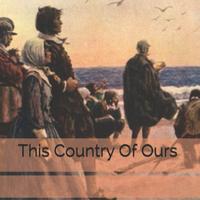Part 4. Chapter 41 - How Benjamin Franklin Came to Philadelphia
After Penn left his colony there was frequent trouble between the Governors and the people. Some of the Governors were untrustworthy, some were weak, none was truly great. But about ten years after Penn's death a truly great man came to Philadelphia. This was Benjamin Franklin. Of all the men of colonial times Franklin was the greatest.
Benjamin was the fifteenth child of his father, a sturdy English Nonconformist who some years before had emigrated from Banbury in England to Boston in America. As the family was so large the children had to begin early to earn their own living. So at the age of ten Benjamin was apprenticed to his own father, who was a tallow chandler, and the little chap spent his days helping to make soap and "dips" and generally making himself useful. But he did not like it at all. So after a time he was apprenticed to his elder brother James, who had a printing press, and published a little newspaper called the Courant. Benjamin liked that much better. He soon became a good printer, he was able to get hold of books easily, and he spent his spare time reading such books as the "Pilgrim's Progress" and the "Spectator." Very soon too he took to writing, and became anxious to have an article printed in his brother's paper. But as he was only a boy he was afraid that if his brother knew he had written the article he would never print it. So he disguised his handwriting, and slipped his paper under the door of the printing house at night. It was found next morning, and to Benjamin's delight was thought good enough to be printed in the paper. After that Benjamin wrote often for the little paper. In time however he and his brother began to quarrel, and when he was seventeen Benjamin decided to go to New York to seek his fortune there.
He took ship to New York in 1723 and arrived there one October day with very little money in his pocket and not a friend in the town. He did not find work in New York, but an old printer advised him to go to Philadelphia where he knew his son was in need of a printer.
Benjamin was already three hundred miles from home, and Philadelphia was another hundred miles farther, but he resolved to go.
Fifty miles of the way he trudged on foot, the rest he went by boat, and after nearly a week of most uncomfortable traveling he arrived one Sunday morning at Philadelphia. He was soaked to the skin, dirty and untidy, hungry and tired. His pockets bulged out with shirts and stockings, but save for one Dutch dollar they were empty of money.
Benjamin was tired and dirty, but before everything he was hungry; so he went to a baker's shop and bought three big rolls. As his pockets were full he tucked two of the rolls under his arm and strolled down the street devouring the third, while the clean tidy folk all ready to go to meeting stared at him in wonder.
Such was the first entry of one of America's greatest statesmen into the town which was henceforth to be his home and where he was to become famous; and as a clever Frenchman said "invent the Republic." In Philadelphia Benjamin found work, and although after a year he left his new home and sailed for England, he soon returned. In ten years' time he was one of the fore most men of Philadelphia and took an interest in everything which concerned the life of the people. He established a circulating library; he was chosen Clerk of the General Assembly; he was appointed postmaster; he established a police force and fire brigade, and helped to found the University of Pennsylvania and the Philadelphia Hospital.
In fact he took an interest in everything connected with the welfare of his adopted city, and of Pennsylvania. And when troubles arose with the British Government Franklin was chosen to go to England to try to put matters right. Later on other colonies too asked for his help, and he went to England as the agent, not only of Pennsylvania but of Massachusetts, New Jersey and Georgia.
He was a philosopher and scientist as well as a diplomatist, and he was the first American whose fame spread all over the world.

